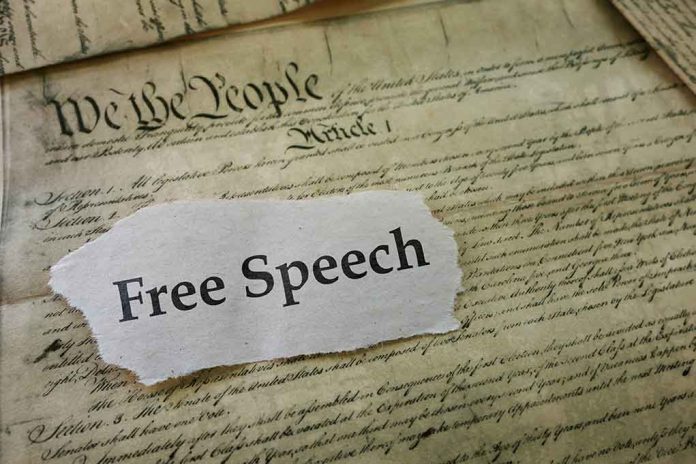
Foreign officials who censor Americans now face being banned from entering the United States under Secretary of State Marco Rubio’s aggressive new visa restrictions policy that puts American free speech rights above global censorship demands.
Key Takeaways
- Secretary of State Marco Rubio has announced visa restrictions for foreign officials who censor or threaten Americans for their social media posts
- The policy targets foreign authorities who issue arrest warrants, demand content moderation, or impose censorship that reaches into United States territory
- Brazil’s Judge Alexandre de Moraes, who has taken action against Elon Musk’s platform X, may face sanctions under the new policy
- The Trump administration has specifically criticized European nations, including Germany and Britain, for their restrictions on free speech
- The policy is based on Section 212(a)(3)(C) of the Immigration and Nationality Act and may also restrict family members of censorship-involved officials
America First Approach to Free Speech Protection
Secretary of State Marco Rubio has implemented a bold new policy restricting visas for foreign officials who attempt to suppress American free speech, particularly on social media platforms. The measure, announced this week, represents a significant component of the Trump administration’s commitment to protecting constitutional rights from foreign interference. Under the new policy, foreign nationals responsible for censoring protected expression by American citizens will be denied entry to the United States, sending a clear message that American free speech rights remain sacrosanct regardless of foreign government preferences.
“It is unacceptable for foreign officials to issue or threaten arrest warrants on US citizens or US residents for social media posts on American platforms while physically present on US soil,” said Marco Rubio, Secretary of State.
The decision follows growing concerns about foreign government overreach, particularly highlighting tensions with Brazilian Supreme Court Judge Alexandre de Moraes, who has taken actions against Elon Musk’s platform X over alleged disinformation. Rubio has hinted that Moraes may face sanctions under the new policy. The administration has also directed criticism toward European nations, including Germany and Britain, for their more restrictive approaches to online speech that conflict with America’s broader free speech protections.
For too long, Americans have been fined, harassed, and even charged by foreign authorities for exercising their free speech rights.
Today, I am announcing a new visa restriction policy that will apply to foreign officials and persons who are complicit in censoring Americans.…
— Secretary Marco Rubio (@SecRubio) May 28, 2025
Legal Framework and Implementation
The policy draws its authority from Section 212(a)(3)(C) of the Immigration and Nationality Act, which empowers the Secretary of State to deny entry to individuals whose presence could have adverse foreign policy consequences for the United States. This legal foundation allows the administration to take decisive action against those who undermine American constitutional rights from abroad. Notably, the restrictions may extend beyond the officials directly involved in censorship activities to include certain family members, creating additional leverage to deter such behavior.
“It is similarly unacceptable for foreign officials to demand that American tech platforms adopt global content moderation policies or engage in censorship activity that reaches beyond their authority and into the United States,” Marco Rubio, Secretary of State, emphasized when announcing the policy.
The State Department has also suspended visa appointments for students until new guidelines on social media screening are fully established. This temporary measure comes as the administration revises its approach to visa issuance across multiple categories. The case of Turkish student Rümeysa Öztürk, who was arrested for criticizing her university’s stance on Gaza, has been cited as an example of the kind of speech-related issues that warrant attention in the visa process.
Global Implications and Administration Priorities
The new visa restrictions highlight a fundamental clash between America’s constitutional free speech protections and more restrictive approaches adopted by other nations. Germany’s restrictions on online hate speech, citing lessons from its Nazi past, and Brazil’s actions to block platforms like X and Rumble for alleged disinformation, stand in stark contrast to the Trump administration’s defense of broad speech protections. The policy represents a clear prioritization of American citizens’ rights over accommodating foreign censorship demands, regardless of how those nations justify their restrictions.
“What this reveals is that the global liberal project is not enabling the flourishing of democracy,” said Samuel Samson, a State Department official, criticizing European social media regulations as suppressing democracy and Western heritage.
Social media regulation has become a significant battleground for the American right, particularly following President Trump’s earlier suspensions from major platforms following the 2020 election disputes. The administration’s approach marks a decisive break from previous government initiatives focused on monitoring misinformation, instead reinforcing fundamental constitutional protections against foreign intimidation or censorship. By establishing clear consequences for foreign officials who attempt to restrict American speech, Rubio’s policy reinforces the autonomy of American citizens expressing their views online, free from external control.













